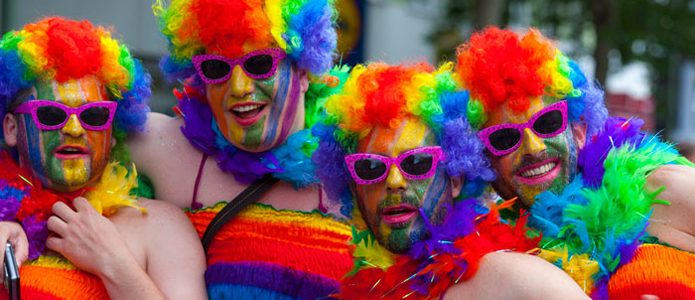Streets decked out in the colours of the rainbow and teeming with flamboyantly dressed revellers – that’s what most people associate with Christopher Street Day in Germany. The parade used to be far more than just a gaudy party, however.
Crowds of party-goers – loud and exuberantly colourful. This is precisely what many people associate with Christopher Street Day (CSD) in Germany. But there is also a story behind the party, one that began in 1979 – when a few hundred took to the streets to demonstrate for more tolerance towards gays, lesbians and transgender people. Nowadays the CSD parade brings hundreds of thousands of people together in a celebration of sexual diversity.
Much had already changed for homosexuals around the world in 1969: during the night of 27 to 28 June, guests of a gay bar in New York protested for the first time against arbitrary police discrimination. The uprising took place at Stonewall Inn, a bar in Christopher Street in Greenwich Village. The riots that took place in Christopher Street are regarded worldwide as the start of the gay, lesbian and transgender movement.
CSD premiere in Germany
It was not until the end of the 1960s that legislators in Germany relaxed Paragraph 175: homosexual relationships between adults were no longer penalized. This change in the law and the Christopher Street resistance motivated many homosexuals to fight for more equality. Gradually, the gay and lesbian scene in Germany began to become more organized. By the mid-1970s, homosexuals in Münster and Bremen were already out on the streets demonstrating for more tolerance, but would conceal their faces for fear of social ostracism. At the time, no solid organizational structure to hold the scene together existed as yet.
That changed at the end of the decade when Germany’s first official Christopher Street Day was staged in Berlin in 1979. Some 450 demonstrators took to the streets in a celebratory and upbeat mood. The parade’s slogan was “gay pride”; this was not so much about making political demands but rather about calling on all gays, lesbians and transgender people to embrace their sexuality with confidence. The demonstrators experienced no hostility or violence – in stark contrast to earlier events.
More and more CSD fans
The number of people taking part in CSD has soared in recent decades. By the early 1990s, tens of thousands were already gathering in Berlin for Christopher Street Day – crowds that hardly anyone had anticipated. Nowadays Berlin, Cologne and Hamburg are among the German cities that attract the most CSD party-goers, with hundreds of thousands having already celebrated Christopher Street Day there. At the same time, however, more and more smaller towns are also staging their own CSD parades – the non-profit organization CSD Deutschland e.V. lists around 50 CSD locations.
Political demands – then and now
The original idea of Christopher Street Day was to fight arbitrary discrimination against homosexuals. CSD is still a day on which to stand up for the rights of sexual diversity – that is to say for the rights of the LGBTI (lesbian, gay, bisexual, transgender and intersex) community. Activists today demonstrate above all for same-sex unions to be put on a completely equal footing with marriage, for full rights to access adoption procedures and for social acceptance of transgender and intersex people.
The legal and social standing of homosexuals has improved significantly over the decades in Germany. Consequently, the political demands are taking more of a back seat, unlike in the past. Nonetheless, a political demonstration is still an integral part of any CSD parade. In larger cities the focus tends to be on nationwide issues, while the political demands in smaller towns are frequently directed at regional decision-makers.
Criticism of the commercial side
Not everyone is crazy about the large, high-profile CSD parties. In some cases the parades are sponsored by breweries, discotheques and other companies – the focus here being on commercial interests. Furthermore, high-level politicians from various parties can be spotted up on the floats; one can only assume that they hope their presence there will improve their standing among the wilder and more colourful sections of the electorate. Some activists are opposed to such commercial considerations and want to prevent CSD being used as a stage for politicians. As a result, a group of activists in Berlin split from the traditional CSD in 1998. They established their own event, the “Transgenialer CSD“, a CSD alternative that has been known since 2014 as “Kreuzberg CSD” or “Kreuzberg Pride”. Political parties, national symbols and commercial firms are not welcome at this protest march.
